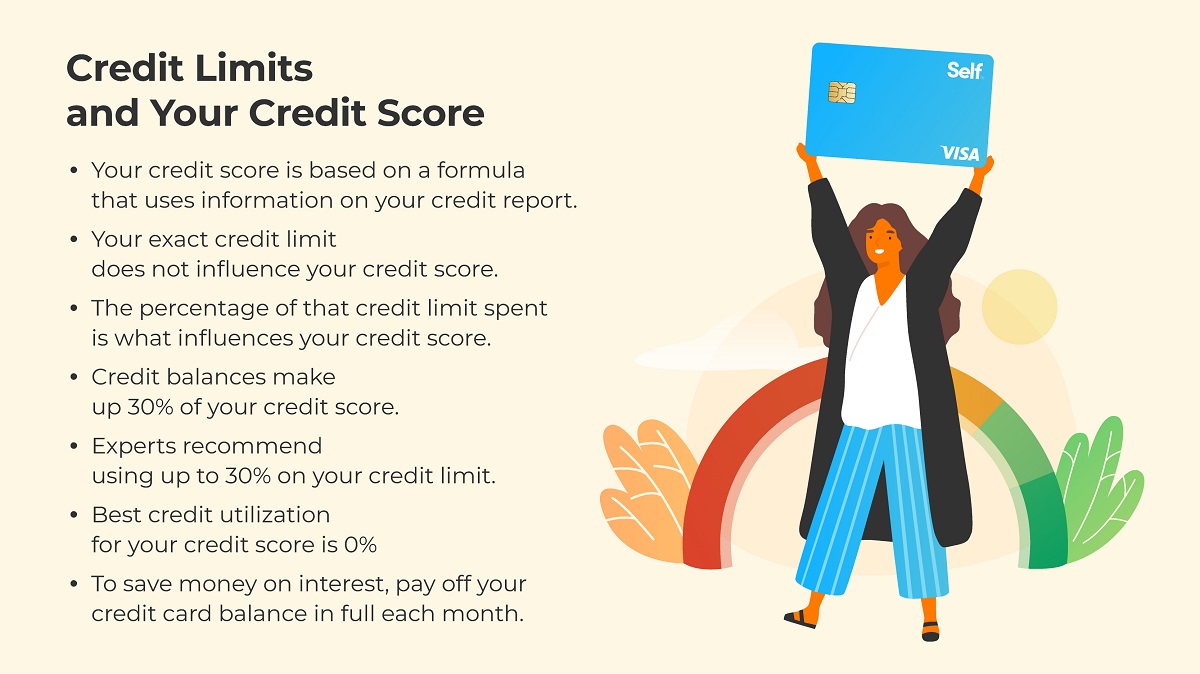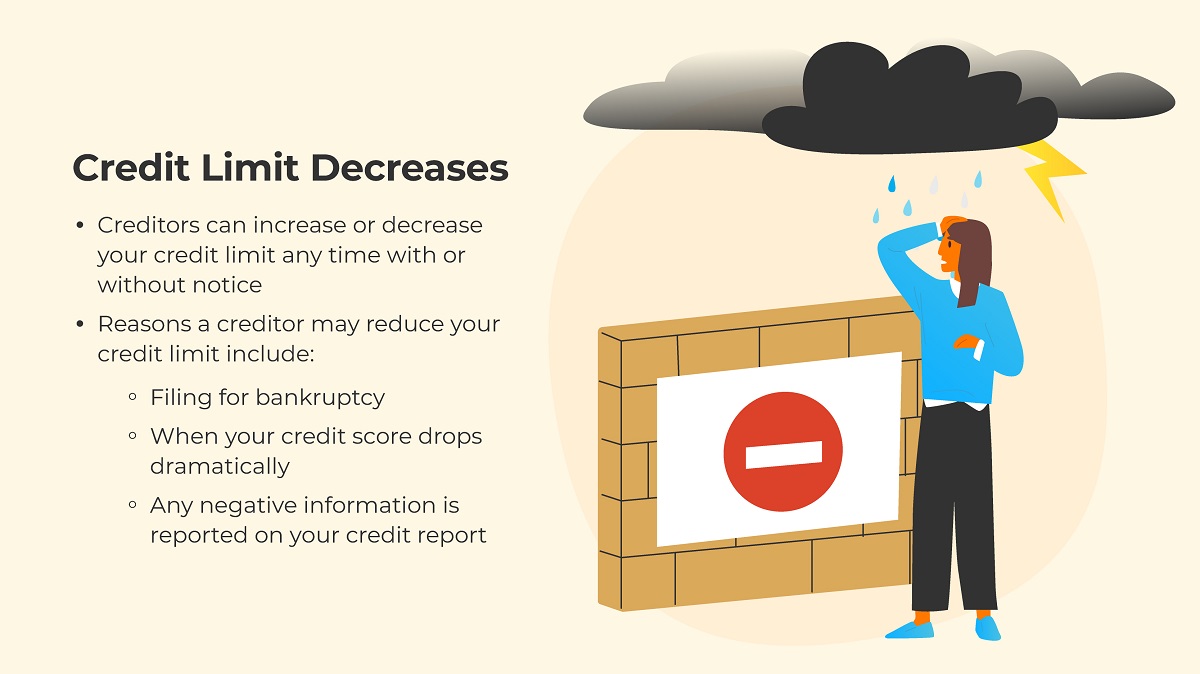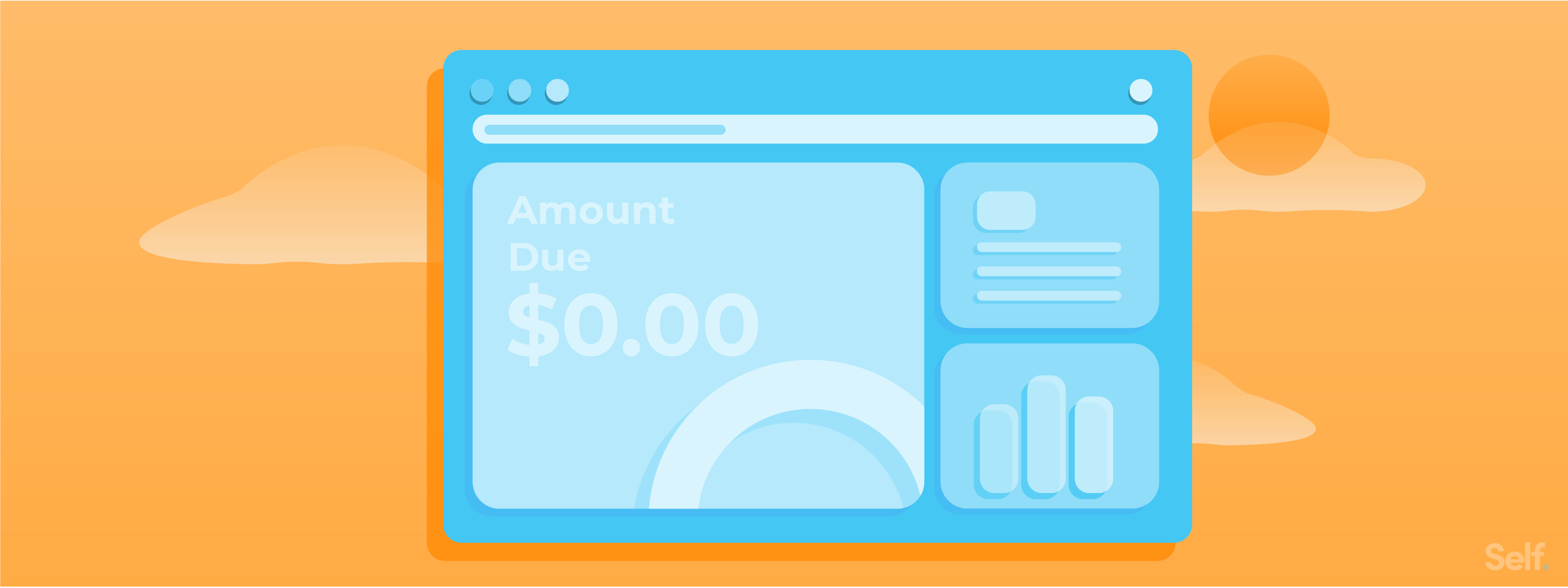What Is A Credit Limit?
In this article:
- What is a credit limit?
- How do lenders determine your credit limit?
- Credit limits and your credit score
- Credit limit increases
- Credit limit decreases
- What does “no preset spending limit” mean?
- Keep balances low to save money and build credit
- The Self Visa® Credit Card credit limit
What is a credit limit?
When you open a new credit card account, most credit card companies give that account a credit limit. The credit limit is the total balance the card issuer will allow you to carry at any given time.While some cards don't have a strict total credit limit at all, most do use a credit limit. You can think of this limit as the maximum amount the bank or other issuer is willing to lend you at once.
This number is important for a wide range of reasons that go beyond how much you can borrow. Your credit limits, and credit limits in relation to balances, are a major input in your credit score, along with your credit history.
take advantage of your total credit limit to get the best long-term results for your finances.
As part of the application review process, banks and other credit card companies look at your credit score and credit report. Using the information in your credit report, generally supplied by one of the three major credit reporting bureaus, the lender chooses your credit card limit. (See how to read a credit report.)
How do lenders determine your credit limit?

Your credit limit is determined using a variety of factors. The creditor will want to give you a limit for your available credit that’s high enough so that you can spend, but not so high that you can't make your monthly payments. They'll consider the following:
- Your credit history and credit score: Both these factors speak to how reliable you are to make payments. Your credit score could also impact the interest rate chosen for your credit account.
- Your current credit history: The amount of credit across your accounts is important to ensure your other cards aren't maxed out. If so, your application will likely be denied by the potential creditor.
- Your income & debt-to-income ratio: Creditors consider this to make sure you'll be able to make the minimum payment on your accounts, especially if you incur any debt.
While your credit limits are important, they're not something you should obsess over. Each credit card company has its own rules and policies when outlining how much available credit you should have. In my own history with credit, I have applied for two cards on the same day at different companies and had widely different credit limits. The importance of credit limits comes more from its impact on your credit score.
If you have a card with a low limit, you shouldn’t rush and close it. You can always ask for a limit increase (more on that below). As long as the card doesn’t charge an annual fee, you should keep it open. It adds to your open credit balances and hopefully contributes to a positive payment history.
In the next section, we will take a look at why that open credit card balance matters.
Some cards may have a lower cash credit limit. This applies to cash advances, which are expensive transactions and best avoided, due to the fees they usually carry. The maximum credit limit for a credit card does not have any specific monthly or annual timeframe. The limit applies as long as the account remains open and in good standing.
If you attempt to spend more than your limit, the credit card company may decline the transaction. Some companies will allow the transaction to go through, but charge you a big over-limit fee. Check your cardholder agreement for details on your own credit card.
Credit limits and your credit score


Your credit score is based on a formula) that includes all the information on your credit report. One of those details is your credit limit. Your credit limit alone is not all that important for your credit score, but the percentage of that limit you use is very important.
In fact, your credit balances make up 30% of your credit score, the second biggest factor after payment history. Most experts suggest that you should never utilize more than 30% of your credit limit, but the best credit utilization for your credit score is 0%.
Contrary to a popular myth, you don’t need to carry a credit card balance at any point for an 800+ credit score. To save money on interest, the best thing you can do is pay off your cards in full every month by the due date. That will also build your credit. It’s a win-win!
Your credit score is based on the balance on the day your credit card company reports the balance to the credit bureaus, which include Experian, Equifax, and TransUnion. But if you consistently keep your balances low and pay off your card in full monthly, you’ll be in good shape when it comes to credit.
Whatever you do, don't treat your maximum credit limit amount as permission to spend. While you can carry a balance up to the credit limit, that doesn't mean you should even if you have a higher credit line! The best balance for any credit card is $0.
Credit limit increases

Your credit score is made up of your cumulative balances and credit limits across all cards. For example, if you have one card with a $500 balance and $5,000 limit and another card with a $1,000 balance and a $1,000 limit, your credit score looks at it as $1,500 in balances out of a $6,000 limit. This is a 25% utilization rate across both accounts.
There are two ways to improve your credit score at this point. First, and the fastest way to increase your score, would be to pay off the $1,500 in balances. But that’s often easier said than done. Another way to improve your credit would be to increase your credit limits.
Wondering how to increase your credit limit? If you could increase your credit limit by $3,000 on each card, you would have a $1,500 balance with $10,000 in limits. That is a 15% utilization rate. You would see an instant 10 percentage point reduction in credit utilization, which would help your credit score. That is a big benefit with no additional cost.
Increasing your credit limits may be easy. If you keep a good payment history with a card issuer, they are likely to want to offer you more credit. A credit card issuer is more likely to increase your credit limit if you maintain or improve your credit score.
Some credit card issuers allow you to request a credit limit increase online. Just log into your account and head to the customer service section to ask for an increase. Some banks make the decision instantly. Others require some time for a response.
When you ask for a limit increase, the credit card issuer may want to review your latest credit report details and most updated credit score. If that’s the case, you may end up with a hard credit pull on your credit report. This type of inquiry does have a mild negative impact on your credit.
In some cases, you may be asked for a specific credit line increase goal. Estimate your needs on the high end. Try to be realistic, but optimistic, on what's possible. As we already discussed, there are many benefits to a bigger limit and no major downsides.
If your request is approved, however, that inquiry is well worth it. A loss of a few points of your credit score could be offset by tens of points of increase over time, if not more. This is because your payment history and credit utilization have a much greater impact on your credit score than hard inquiries, which usually fall off your credit report in 24 months.
Credit limit decreases

While not all that common, credit card companies are also able to decrease your credit limit. According to the CFPB [2], creditors can increase or decrease your credit limit at any time with or without notice.
If your credit score goes down dramatically, you file for bankruptcy, or another major negative item shows up on your credit, don’t be shocked if lenders lower limits and close accounts. Even accounts that have been handled well are at risk if you stop paying elsewhere.
If a credit card company does lower your credit limit, you have 45 days to get your balance under that limit before they can charge any fees for going over your limit [2].
What does “no preset spending limit” mean?
Some high limit credit cards don’t have a set credit limit. If you have one of these cards, a limit may not be reported to the credit bureaus. This is not ideal for your credit score rating, but if you have a good or better score you shouldn’t worry too much about a negative impact.If you ever do run into a situation where a charge is declined, call the number on the back of the card to ask for approval on that specific transaction from your card provider. If you’ve hit the limit that your credit union or financial institution is willing to lend, they will let you know.
Keep balances low to save money and build credit

A high credit limit is a great financial resource and tool to build your credit, but that doesn’t mean you should use all of it. You should use as little of your credit as possible to both save money and build your credit.
If you can do that while always making on-time payments, you should be on track for an excellent credit score in the future. You may have to be patient, but you can rest easy that you are doing things right for your credit.
For those that don't have a good credit score and can't qualify for a regular card, a credit builder loan may be a good place to start building credit. A credit builder loan could help you build your credit even if you've never had any credit history to begin with.
Increasing the credit limit of the Self Visa® Credit Card
Follow this link if you're looking for information about increasing the credit limit of your Self Visa® Credit Card. Read on for more information if you don't yet have a Self secured credit card.Sources:
- Consumer Finance Protection Bureau. “Why Did I Get A Low Limit On A Credit Card?” https://www.consumerfinance.gov/ask-cfpb/why-did-i-get-a-low-credit-limit-on-a-credit-card-en-11/ Accessed March 23, 2021
- Consumer Finance Protection Bureau. “Can My Credit Card Issuer Reduce My Credit Limit?” https://www.consumerfinance.gov/ask-cfpb/can-my-credit-card-issuer-reduce-my-credit-limit-en-74/ Accessed March 23, 2021
About the Author
Eric Rosenberg is the creator of the Personal Profitability blog and podcast. He has both an undergraduate degree and a MBA in finance and his work has appeared in various media outlets. See Eric on Linkedin and Twitter.About the reviewer
Lauren Bringle is an Accredited Financial Counselor® with Self Financial– a financial technology company with a mission to help people build credit and savings. See Lauren on Linkedin and Twitter.Editorial Policy
Our goal at Self is to provide readers with current and unbiased information on credit, financial health, and related topics. This content is based on research and other related articles from trusted sources. All content at Self is written by experienced contributors in the finance industry and reviewed by an accredited person(s).
Written on March 21, 2019
Self is a venture-backed startup that helps people build credit and savings.
Self does not provide financial advice. The content on this page provides general consumer information and is not intended for legal, financial, or regulatory guidance. The content presented does not reflect the view of the Issuing Banks. Although this information may include references to third-party resources or content, Self does not endorse or guarantee the accuracy of this third-party information. Any Self product links are advertisements for Self products. Please consider the date of publishing for Self’s original content and any affiliated content to best understand their contexts.